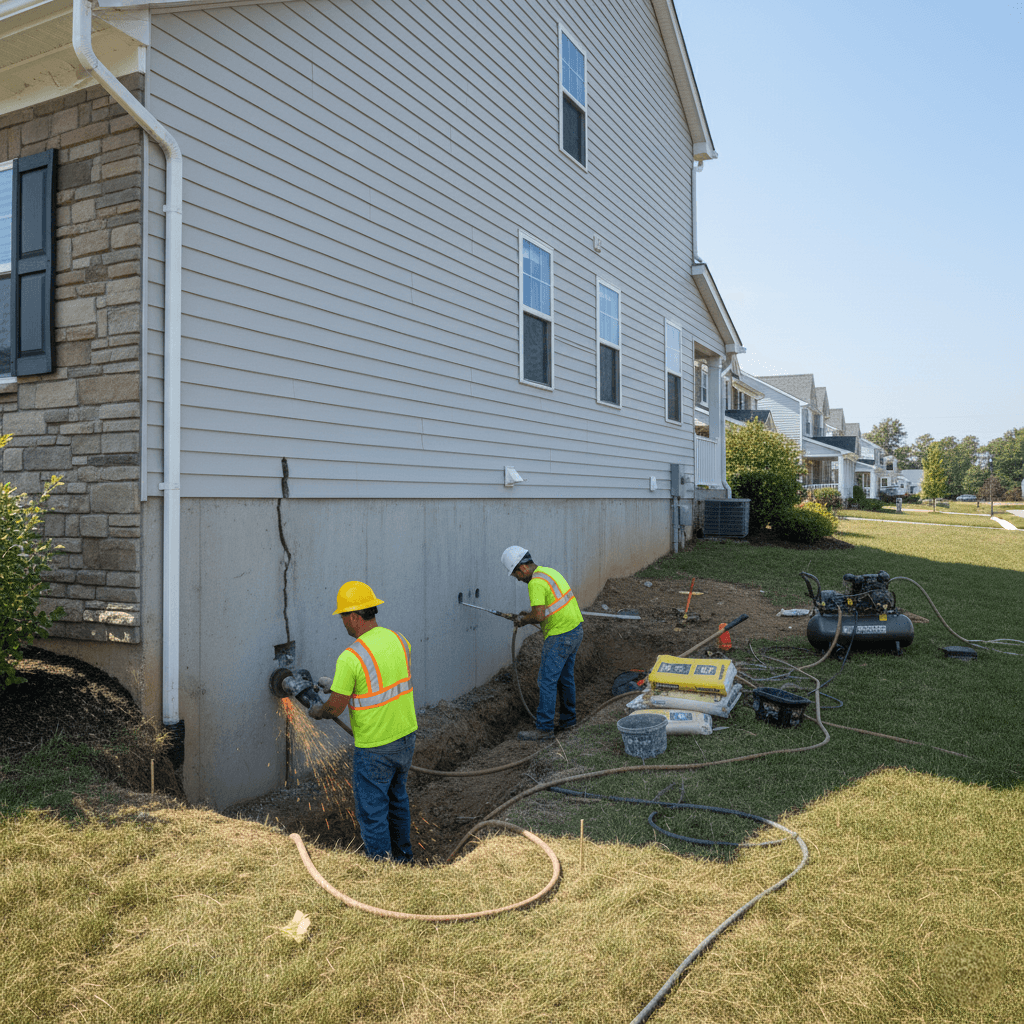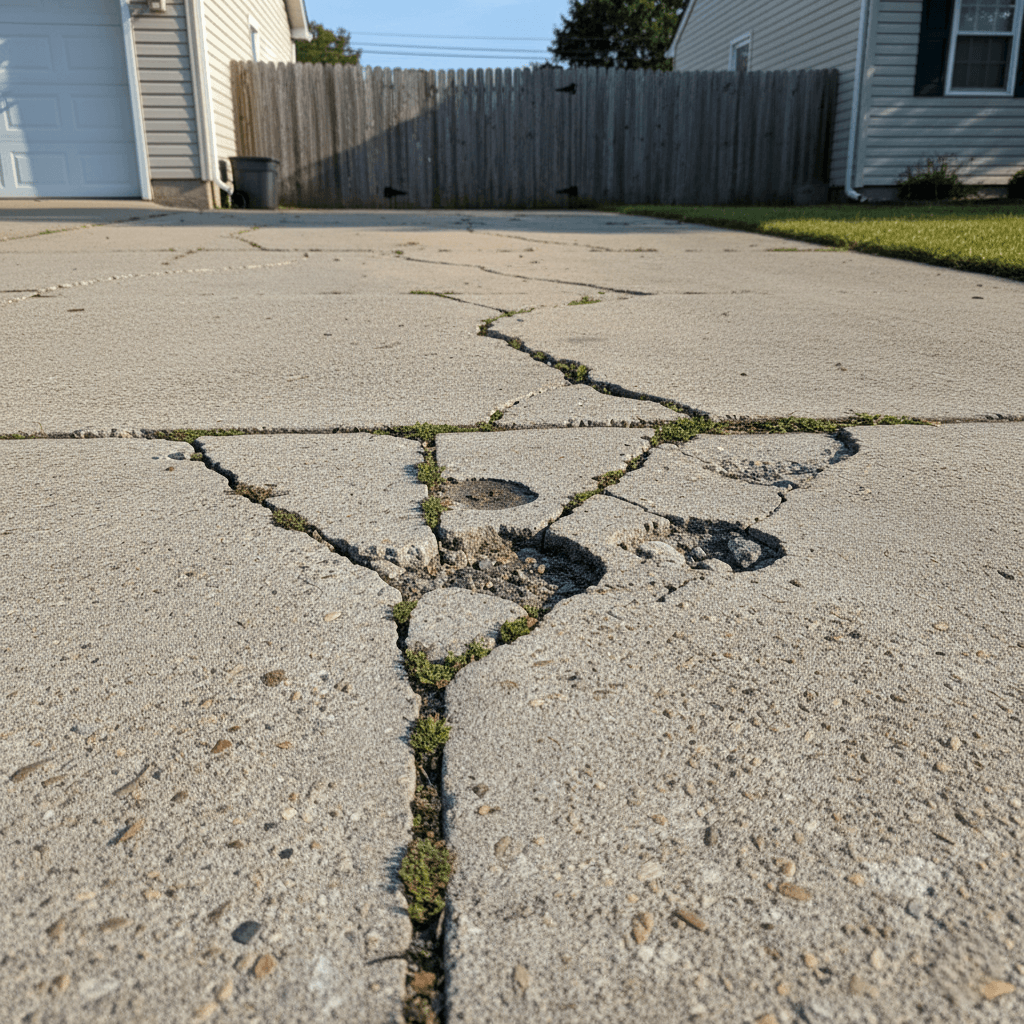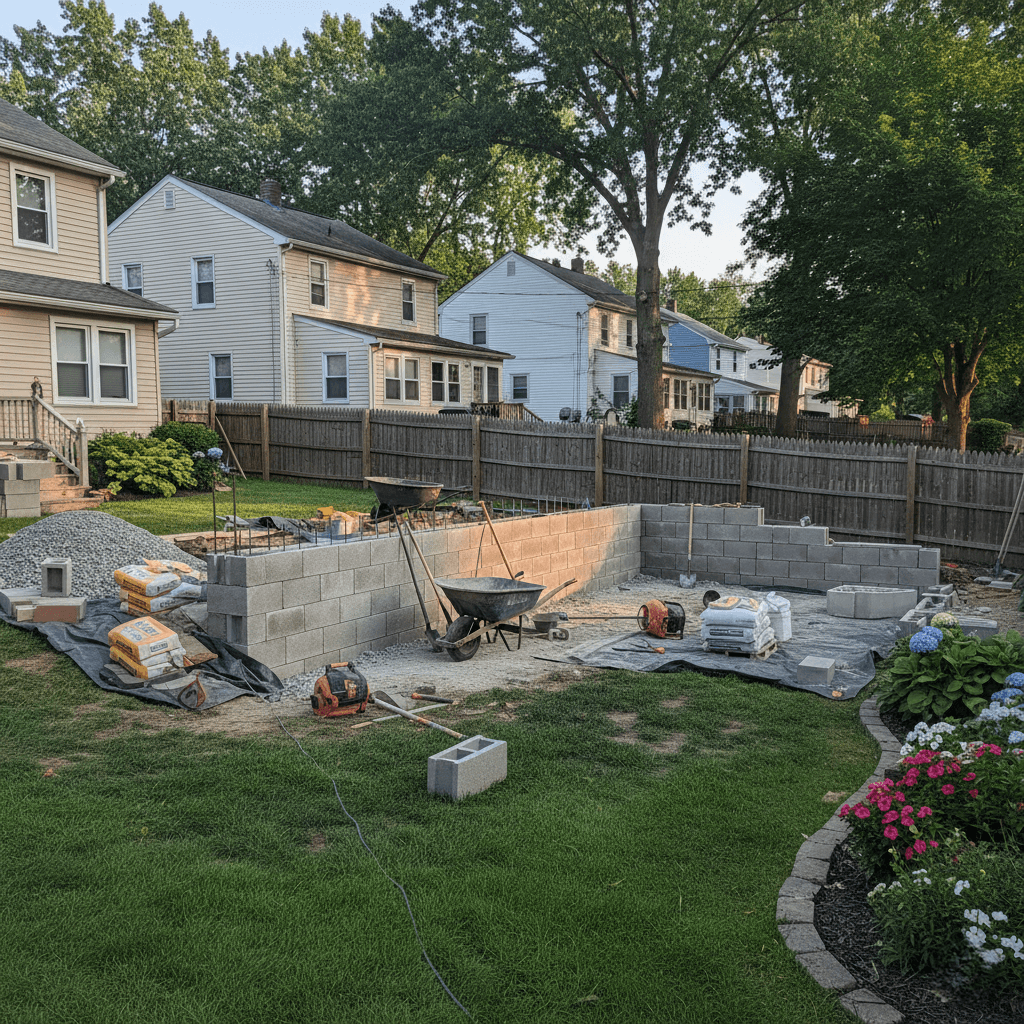Paterson Concrete Works - Frequently Asked Questions
If Your Question Is Not Answered Here Drop Us A Line
What does professional concrete driveway installation cost per square foot in Paterson?
Professional concrete driveway installation in Paterson, New Jersey, typically ranges from $11 to $18 per square foot, reflecting the Northeast’s challenging climate and strict building requirements. Standard 5-inch reinforced installations cost $11 to $14 per square foot, while premium 6-inch driveways with decorative finishes reach $16 to $18 per square foot. New Jersey’s rigorous building codes and freeze-thaw requirements increase material costs substantially. The competitive New York metropolitan area market helps moderate pricing, though prevailing wage laws and seasonal construction limitations during harsh winters can significantly impact project scheduling and total expenses.
How do complete replacement expenses compare to driveway resurfacing in Paterson?
Full driveway replacement in Paterson costs $13 to $21 per square foot, while professional resurfacing services range from $6 to $12 per square foot. Replacement involves complete demolition, excavation below New Jersey’s deep frost line (36 inches), proper drainage installation for the region’s heavy precipitation, and new concrete meeting stringent state freeze-thaw resistance standards. Resurfacing applies a bonded overlay over structurally sound existing concrete. New Jersey’s severe winter conditions often make replacement more economical long-term, despite higher initial investment, due to superior durability and freeze-thaw resistance compared to overlay systems.
What price difference exists between decorative stamped concrete and standard textured patios in Paterson?
Standard broom-finish patios in Paterson cost $12 to $17 per square foot, while stamped concrete installations range from $18 to $28 per square foot for professional installation. The premium reflects specialized labor for intricate pattern work, color integration systems, and enhanced protective sealing required for New Jersey’s harsh freeze-thaw conditions. Popular Paterson patterns include natural stone, brick, and colonial designs that complement the area’s historic architectural character. Both finishes require air-entrained concrete and comprehensive drainage design to handle New Jersey’s heavy snow loads and aggressive spring melting conditions.
What variables influence concrete pricing per cubic yard in Paterson, including delivery and specialized additives?
Paterson ready-mix concrete costs $130 to $175 per cubic yard, with short-load premiums of $35 to $50 per yard for deliveries under 8 cubic yards, pump truck charges of $400 to $650 per job, and delivery fees of $7 to $10 per mile beyond 25 miles from local plants. New Jersey-mandated air entrainment adds $8 to $16 per yard, while winter accelerators cost an additional $18 to $28 per yard during cold months. Anti-washout admixtures for heavy precipitation add $12 to $20 per yard. Regional market competition helps moderate base pricing, but specialized admixtures required for New Jersey’s harsh climate substantially increase overall project costs.
What thickness specification performs optimally for Paterson driveways?
Six-inch thickness provides the best performance for Paterson driveways facing New Jersey’s severe freeze-thaw cycles, heavy snow loads, and aggressive snow removal equipment operations. Five-inch meets minimum code requirements but may develop stress cracks during harsh Northeast winters with repeated temperature cycling. Four-inch thickness proves completely inadequate for New Jersey conditions except for the lightest duty applications. Thickened edges to 8 to 10 inches are essential where vehicles park or turn frequently. The additional thickness provides a crucial durability margin for surviving the Northeast’s challenging winter conditions and intensive snow removal operations.
What slope specifications ensure adequate drainage for Paterson concrete installations?
Paterson driveways require a minimum of 1/4 inch per foot slope (2%) with 1/2 inch per foot (4%) strongly recommended for New Jersey’s heavy precipitation, including intense spring snowmelt and frequent heavy rainfall events. Patios need a minimum of 1/4 inch per foot slope away from structures to effectively handle the Northeast’s substantial precipitation patterns and storm events. Maximum slopes of 7% prevent finishing problems and surface scaling during installation procedures. Proper drainage design is absolutely critical in Paterson due to clay soils, high annual precipitation exceeding 40 inches, and potential for ice dam formation during extended winter periods.
When are concrete overlays suitable for existing surfaces in Paterson?
Overlays work effectively in Paterson when existing concrete shows minimal freeze-thaw damage and remains structurally sound after enduring New Jersey’s harsh winters. Surface preparation must include thorough cleaning, comprehensive acid etching, and bonding agents specifically rated for the Northeast extreme climate conditions. Minimum 3.5-inch overlay thickness is recommended for New Jersey conditions, with 4 inches providing optimal long-term durability and freeze-thaw resistance. Overlays aren’t recommended for extensively damaged concrete that has suffered multiple freeze-thaw cycles and salt exposure. Complete replacement often proves more economical, given New Jersey’s harsh climate impacts on compromised existing concrete structures.
What temperature limitations restrict concrete placement in Paterson?
Paterson concrete pours should avoid temperatures below 40°F or above 85°F to ensure proper curing and long-term durability in New Jersey’s variable climate. The state’s climate requires extensive cold-weather protection from November through March, including heated aggregates, warm mixing water, and comprehensive insulated curing systems for optimal results. Hot-weather precautions apply during summer months with retarders and strategic scheduling to avoid peak afternoon temperatures and thermal shock. Concrete temperature at placement should be maintained at 55 to 75°F for proper hydration and strength development. New Jersey’s variable conditions require immediate adaptation of temperature control measures throughout the extended construction season.
What is the concrete curing timeline for traffic loading in Paterson's climate?
Paterson concrete supports pedestrian traffic after 48 to 72 hours and vehicles after 12 to 18 days under normal conditions, with New Jersey’s cold, humid winters significantly extending curing requirements for optimal strength development. Winter pours may need 28 to 56 days before safe vehicle loading due to slow strength gain in consistently cold temperatures. Summer humidity can accelerate early curing, but requires extended moist curing for maximum strength and durability development. Monitor weather conditions closely and extend curing periods substantially during Northeast winters when temperatures remain consistently low for extended periods, affecting the hydration process.
When should new concrete be sealed in Paterson, and what sealer type provides optimal protection?
Seal new Paterson concrete 30 to 90 days after placement, allowing proper curing and thorough surface preparation in New Jersey’s humid climate conditions. Penetrating silane/siloxane sealers provide superior performance against Northeast freeze-thaw cycles, heavy precipitation, and aggressive de-icing salt exposure throughout harsh winter months. Avoid topical acrylics on exterior surfaces exposed to New Jersey winters, as they often fail under severe freeze-thaw stress and chemical exposure. Apply sealers during mild, dry weather conditions (50 to 75°F) with low humidity, and reapply every 2 to 3 years due to severe Northeast exposure conditions and chemical de-icer damage.
What constitutes normal versus concerning crack patterns in Paterson concrete?
Hairline cracks under 1/16 inch are normal in Paterson due to New Jersey’s extreme temperature variations between seasons and significant daily temperature swings during transitional periods. Cracks exceeding 1/8 inch in width, showing vertical displacement, or admitting water penetration require immediate professional evaluation and repair intervention. Structural concerns often result from freeze-thaw damage, inadequate reinforcement for New Jersey codes, poor drainage design, or settlement in unstable clay soils. The Northeast’s de-icing salt exposure can rapidly accelerate crack deterioration once water intrusion begins during the winter months. Document crack patterns carefully and consult structural engineers for issues suggesting foundation problems or major structural deficiencies requiring immediate attention.
Are permits and HOA approvals necessary for Paterson concrete projects?
Paterson requires building permits for most concrete work, including driveways, substantial patios, and all structural concrete installations within city boundaries and jurisdiction. Contact the Paterson Building Department at (973) 321-1100 for specific permit requirements, current fee schedules, and comprehensive inspection procedures. Permit fees typically range from $175 to $600, depending on project complexity, size, and property value assessments. Historic district properties may require additional approvals from preservation commissions and architectural review boards. Many neighborhoods have HOA restrictions on concrete appearance, color, texture, and placement that must be addressed before beginning work to avoid expensive correction requirements and potential legal complications.
What New Jersey and Paterson codes apply to concrete construction requirements and standards?
Paterson enforces the New Jersey State Building Code with local amendments for concrete construction in the Northeast’s harsh climate conditions. Driveways require a minimum 5-inch thickness with proper reinforcement, air-entrained concrete for comprehensive freeze-thaw protection, and adequate drainage slope for heavy precipitation management and snowmelt handling. Footings must extend below New Jersey’s 36-inch frost line depth requirement for foundation stability and freeze protection. All exterior concrete needs comprehensive freeze-thaw protection meeting ACI 318 standards as adopted by New Jersey, with additional cold-weather provisions. Commercial projects require professional engineering oversight and design approval. Contact the Paterson Building Department for local code interpretations and specific compliance requirements.
What inspection protocols apply to Paterson concrete projects under city and state regulations?
Paterson mandates comprehensive inspections for permitted concrete work, including excavation and footing inspection before concrete placement, detailed reinforcement and form inspection, and thorough final completion inspection. Schedule inspections at least 24 hours in advance through the Paterson Building Department at (973) 321-1100 or through their online inspection portal. Inspectors verify New Jersey Building Code compliance, including thickness measurements, air entrainment verification, reinforcement placement and spacing, and proper slope installation for drainage. Work cannot legally advance without inspection approval, and failed inspections require corrections and re-inspection scheduling with additional fees and potential significant project delays.
What should I ask concrete contractors in Paterson about qualifications and service guarantees?
Verify that Paterson concrete contractors maintain current New Jersey contractor licenses, comprehensive general liability insurance with minimum $2 million coverage, and up-to-date workers’ compensation insurance protection for all employees. Request 5 to 8 recent local references with complete contact information and detailed photographs of completed projects demonstrating quality workmanship in Northeast harsh climate conditions. Warranties should provide comprehensive coverage for workmanship defects for 2 to 4 years and structural issues for 3 to 7 years minimum, with specific provisions for freeze-thaw damage. Obtain comprehensive written estimates specifying New Jersey Building Code-compliant air-entrained mix designs, freeze-thaw resistant reinforcement details, precise thickness requirements, and detailed finishing specifications. Confirm their thorough understanding of New Jersey’s harsh climate requirements, freeze-thaw protection methods, Paterson permit processes, and proven installation techniques for Northeast challenging winter conditions and unstable clay soil characteristics.



